No products in the cart.
We deliver to:
🇦🇺 Australia
🇨🇦 Canada
🇨🇿 Czechia
🇩🇰 Denmark🇪🇪 Estonia
🇮🇪 Ireland
🇮🇱 Israel
🇮🇹 Italy
🇯🇵 Japan
🇲🇽 Mexico
🇵🇱 Poland
🇰🇷 South Korea
🇨🇭 Switzerland
🇬🇧 United Kingdom
🇺🇸 United States of Americaand more
We deliver to:
🇦🇺 Australia
🇨🇦 Canada
🇨🇿 Czechia
🇩🇰 Denmark🇪🇪 Estonia
🇮🇪 Ireland
🇮🇱 Israel
🇮🇹 Italy
🇯🇵 Japan
🇲🇽 Mexico
🇵🇱 Poland
🇰🇷 South Korea
🇨🇭 Switzerland
🇬🇧 United Kingdom
🇺🇸 United States of Americaand more

Geucamen ointment tuba 40 g
$14.60
Zotek film-coated tablets 400 mg blister 10 pcs.
$17.89
Free Worldwide Shipping
to: Australia, Canada, Czechia, Denmark, Estonia, Ireland, Israel, Italy, Japan, Mexico, Poland, South Korea, Switzerland, United Kingdom, United States and more
In stock
Zotek (dexibuprofen) film-coated tablets for mild to moderate pain relief, inflammation, and fever. Effective NSAID with proven action.
Category: Gastrointestinal tract and liver
Brand: Organosyn
Payment
PayPal, Debit or Credit card, Google Pay, Apple Pay
Dosage form
Film-coated tablets.
Main physicochemical properties:
Zotek -200: round biconvex tablets, film-coated white.
Zotek -300 and Zotek -400: oblong biconvex tablets, film-coated, white in color with a score line on one side.
Pharmacological properties
Dexibuprofen is a pharmacologically active isomer of racemic ibuprofen. NSAID with antipyretic and analgesic properties. The action of the drug is based on the inhibition of prostaglandin synthesis, exhibits the ability to inhibit the production of leukotrienes, reduce inflammatory edema due to the effect on polymorphonuclear leukocytes and reduce the production of nitric oxide, mitochondrial oxidation of fatty acids.
Dexibuprofen is rapidly and completely absorbed in the small intestine. C max in the blood is reached 2 hours after taking 200 mg of the drug. Elimination from the synovial fluid occurs slowly, thereby maintaining a constant concentration that does not depend on the concentration of the drug in the blood plasma.
It is metabolized in the liver, after which it is excreted as inactive metabolites, mainly (90%) by the kidneys, the rest – with bile.
T ½ – 1.8-3.5 h, binding to plasma proteins – about 99%. When using dexibuprofen with food, the time to reach C max in the blood increases from 2.1 to 2.8 h and C max in the blood plasma decreases from 20.6 to 18.1 μg/ml, but food does not affect the extent of absorption.
Indication
Symptomatic therapy for mild to moderate pain of various origins: toothache, back pain, joint pain, muscle pain, rheumatic pain, dysmenorrhea.
You can use Zotek 400 for fever.
Application
The dosage regimen is set individually, taking into account the intensity of the pain syndrome. Adults are usually prescribed 1-2 tablets (200-400 mg of dexibuprofen) 3 times a day after meals. The recommended initial dose is 200 mg of dexibuprofen. The recommended daily dose is 600-900 mg of dexibuprofen, divided into 3 doses. The highest daily dose is 1200 mg, the highest single dose is 400 mg. In dysmenorrhea, the highest single dose is 300 mg, the maximum daily dose is 900 mg. It is advisable to take it with meals. The drug is intended for symptomatic relief of pain syndrome, but if the symptoms of the disease persist for 3 days, are accompanied by high body temperature, headache or other phenomena, it is necessary to clarify the diagnosis and additional correction of the treatment regimen.
Use in the elderly. It is recommended to start therapy with low doses. It can be increased to the recommended daily dose only after good tolerability of the drug has been established.
Use in patients with impaired liver and kidney function. Patients with moderate liver and kidney function should be started with caution at a reduced dose. Zotek is contraindicated in patients with severe liver or kidney function impairment.
Contraindication
- Hypersensitivity to dexibuprofen or other nonsteroidal anti-inflammatory drugs and other components of the drug in the form of an asthma attack, bronchospasm, acute rhinitis, or nasal polyps, urticaria and angioedema in history; ba; gastrointestinal bleeding, other bleeding or blood clotting disorders; hemorrhagic diathesis and other coagulation disorders or anticoagulant therapy; erosive-ulcerative lesions of the gastrointestinal tract in the acute phase, nonspecific ulcerative colitis in the acute phase, Crohn’s disease in the acute phase; severe liver and kidney dysfunction; leukopenia, thrombocytopenia; uncontrolled hypertension, heart failure; optic nerve disease, color perception disorders.
Side effects
Gastrointestinal tract: dyspepsia, diarrhea, nausea, vomiting, abdominal pain, with prolonged use – gastric and duodenal ulcers, gastrointestinal bleeding, ulcerative stomatitis, rarely – gastrointestinal perforation, flatulence, constipation, esophagitis, esophageal strictures. exacerbation of diverticulitis, nonspecific hemorrhagic colitis, ulcerative colitis or Crohn’s disease.
Skin: rash, urticaria, pruritus, purpura (including allergic purpura), erythema multiforme, epidermal necrolysis, alopecia, photosensitivity, Stevens-Johnson syndrome, acute toxic epidermal necrolysis (Lyell’s syndrome) and allergic vasculitis.
Hypersensitivity reactions: fever, headache, rhinitis, bronchospasm, asthma, tachycardia, hypotension, shock, anaphylactic reaction, angioedema, systemic lupus erythematosus, other collagen diseases.
Nervous system: dizziness, fatigue, drowsiness, insomnia, anxiety, visual hallucinations, psychotic reactions, irritability, depression, disorientation, double vision, ringing or tinnitus, aseptic meningitis.
On the part of the blood: prolongation of blood clotting time, rarely – thrombocytopenia, leukopenia, granulocytopenia, pancytopenia, agranulocytosis, aplastic anemia, hemolytic anemia.
Cardiovascular system: peripheral edema. Increased blood pressure and heart failure may occur, especially in the elderly.
Fluid retention is possible in patients with hypertension or impaired renal function.
From the urinary system: interstitial nephritis, nephrotic syndrome, renal failure cannot be excluded taking into account the experience of using NSAIDs, hepatic failure.
Other: in very rare cases there may be increased sweating.
Special instructions
It should be used with caution in patients with a history of gastrointestinal diseases. Persons in this group require careful examination and observation. When prescribing the drug to patients with impaired cardiovascular system, hypertension, renal and hepatic insufficiency, especially with concomitant treatment with diuretics, it is necessary to take into account the existing risk of fluid retention and deterioration of renal function. In such patients, it is recommended to use the lowest dose and regularly monitor renal function.
The drug should be used with particular caution in the elderly.
It should be used with caution in patients with systemic lupus erythematosus and connective tissue diseases, as they may be at risk of CNS disorders and renal side effects.
It is necessary to monitor kidney and liver function in patients using dexibuprofen for a long time.
Use during pregnancy and breastfeeding. The drug is not recommended for use during pregnancy, as well as for women planning to become pregnant.
Inhibition of prostaglandin synthesis may adversely affect pregnancy and/or embryo/foetal development. Epidemiological data indicate an increased risk of miscarriage, congenital heart defects and gastroschisis after use of prostaglandin synthesis inhibitors in early pregnancy. The absolute risk of cardiovascular malformations increased from less than 1% to 1.5%. The risk is believed to increase with increasing dose and duration of therapy. In animal studies, prostaglandin synthesis inhibitors have been shown to increase pre- and post-implantation embryo-foetal lethality. There has also been an increase in the incidence of various malformations, including cardiovascular. During the third trimester of pregnancy, the use of any prostaglandin synthesis inhibitor may cause effects on the fetus such as cardiopulmonary toxicity (premature closure of the fetal ductus arteriosus with pulmonary hypertension) and renal dysfunction, which may progress to renal failure with oligohydramnios; maternal condition: suppression of uterine contractility, which may lead to increased duration of labor with possible increased bleeding time in the mother and child, even when using very low doses.
Dexibuprofen passes into breast milk. The use of dexibuprofen is contraindicated during breastfeeding. If treatment is necessary, breastfeeding should be discontinued.
Children. The drug is not used in pediatric practice.
Ability to influence the reaction rate when driving vehicles or working with other mechanisms. With a single or short-term use, the drug does not affect the reaction rate and the ability to drive vehicles or work with other mechanisms. During long-term use, the possibility of such an undesirable reaction as dizziness, which may affect the reaction rate when driving vehicles or working with other mechanisms, cannot be ruled out.
Interactions
Do not use a combination NSAID drug as kidney damage may occur with the risk of AKI.
NSAIDs should be used with caution with other drugs that may increase the risk of gastrointestinal bleeding, perforation, and renal impairment.
The use of Zotek with any other drug that inhibits COX/prostaglandin synthesis may impair fertility and is therefore not recommended for women attempting to conceive.
When dexibuprofen interacts with oral anticoagulants, acetylsalicylic acid, it may prolong blood clotting time and inhibit platelet aggregation.
When methotrexate is administered concomitantly at a dose of 15 mg/kg, blood tests and renal function tests should be performed during the first weeks, especially in the elderly. Methotrexate administered at a dose of ≥15 mg/kg should be administered 24 hours after dexibuprofen. Due to the increased plasma concentration of this drug as a result of reduced renal excretion, the toxicity of methotrexate is increased, therefore concomitant use of dexibuprofen is not recommended.
Lithium: NSAIDs may increase blood lithium concentrations by reducing its renal excretion. The combination is not recommended.
Special caution should be exercised when combining antihypertensive drugs with nonsteroidal anti-inflammatory drugs, as the effectiveness of β-adrenergic blockers is reduced.
Concomitant use with ACE inhibitors or angiotensin II receptor antagonists may reduce the hypotensive effect of angiotensin II receptor antagonists and ACE inhibitors and may increase the risk of acute renal failure, especially in patients with a history of impaired renal function or the elderly.
Cyclosporine, tacrolimus when used simultaneously may increase the risk of nephrotoxicity due to reduced prostaglandin synthesis in the kidneys. It is necessary to monitor renal function, especially in the elderly.
Glucocorticoids, when used concomitantly, may increase the likelihood of gastrointestinal bleeding.
Concomitant use of Zotek with digoxin increases the concentration of the latter in the blood plasma and its toxicity.
Zotek may displace phenytoin from protein binding, possibly leading to increased blood concentrations and toxicity. Therefore, monitoring of phenytoin blood concentrations is recommended.
Thiazide, related, loop and potassium-sparing diuretics, when used concomitantly with nonsteroidal anti-inflammatory drugs, may increase the risk of developing renal failure and cause a secondary decrease in renal blood flow.
Drugs that increase potassium concentration when used simultaneously with dexibuprofen lead to an increase in potassium concentration and require determination of potassium concentration in the blood.
Thrombolytics, ticlopidine, antiplatelet agents when used simultaneously with nonsteroidal anti-inflammatory drugs may enhance the antiplatelet effect.
Anticoagulants: NSAIDs may enhance the effects of anticoagulants such as warfarin. In case of concomitant use, it is recommended to monitor coagulation processes and adjust the dose of anticoagulants if necessary.
Overdose
Symptoms: dizziness, lightheadedness, abdominal pain, nausea, vomiting, drowsiness, headache, nystagmus, tinnitus, ataxia, gastrointestinal bleeding, hypotension, hypothermia, metabolic acidosis, impaired renal function, rarely – loss of consciousness.
Treatment: symptomatic, there is no specific antidote.
Gastric lavage with water may be used (only within the first hour after ingestion). Activated charcoal is prescribed. Hemodialysis is ineffective due to the high degree of protein binding.
Storage conditions
In the original packaging at a temperature not exceeding 25 °C.
Be the first to review “Zotek film-coated tablets 400 mg blister 10 pcs.” Cancel reply
You may also like


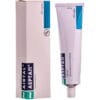
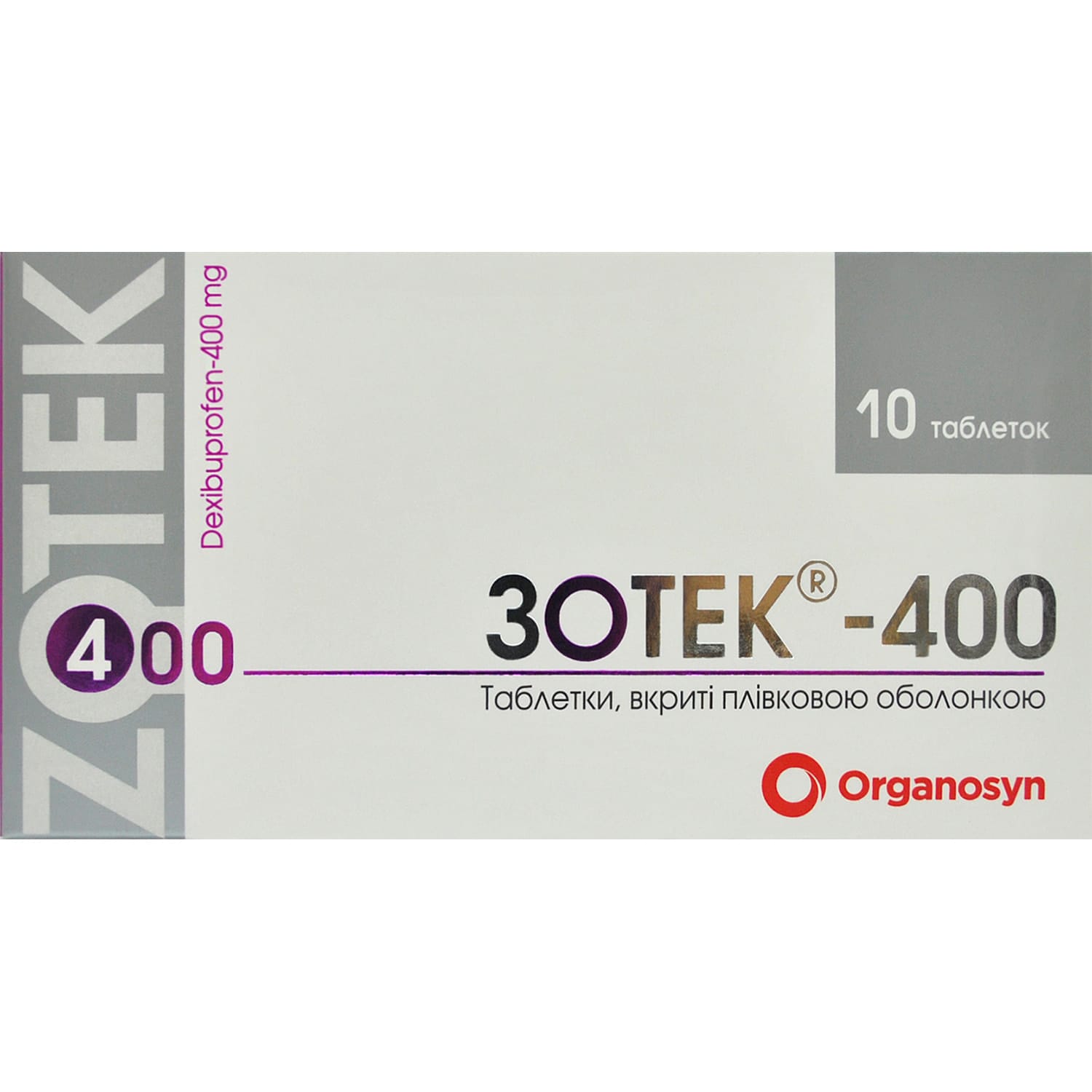
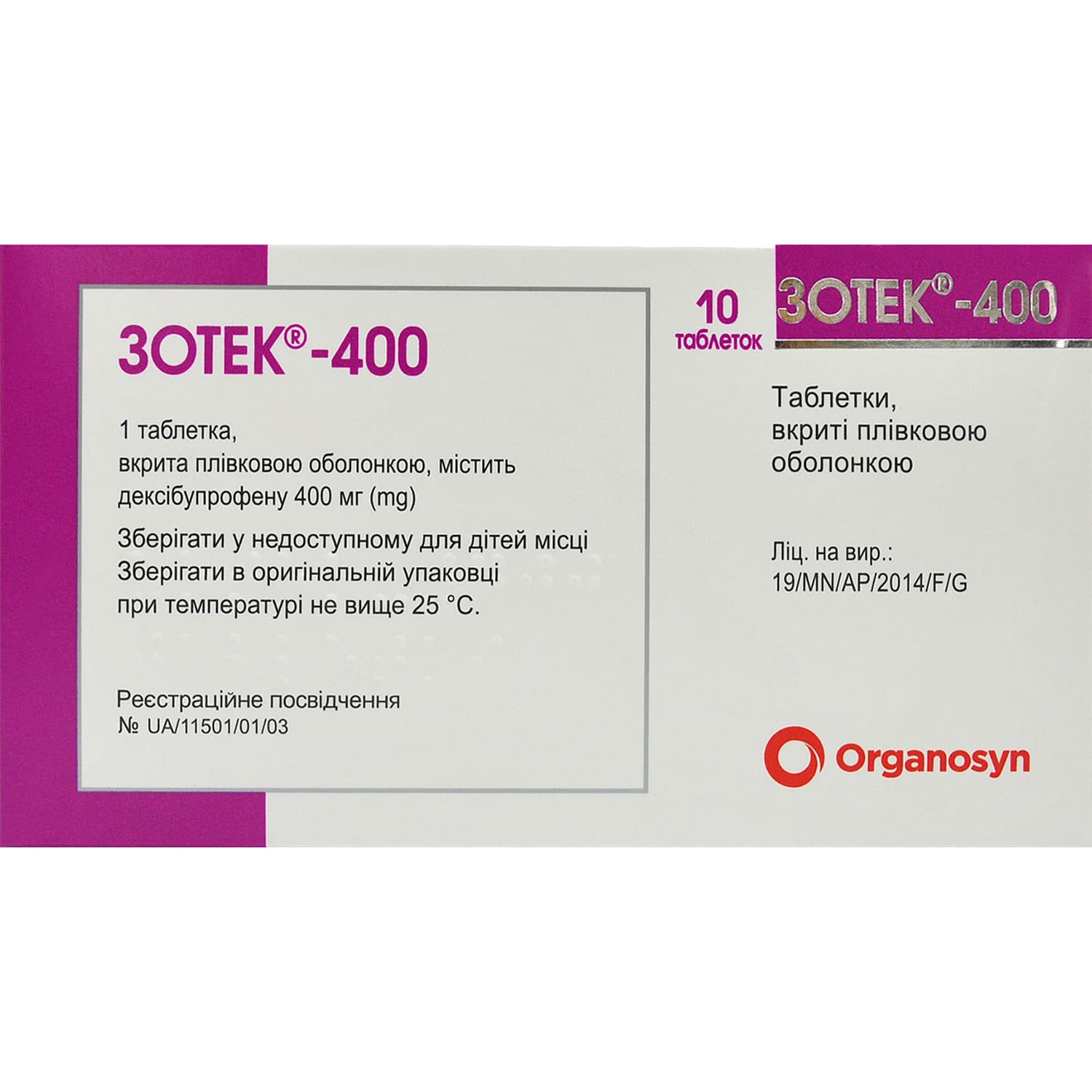
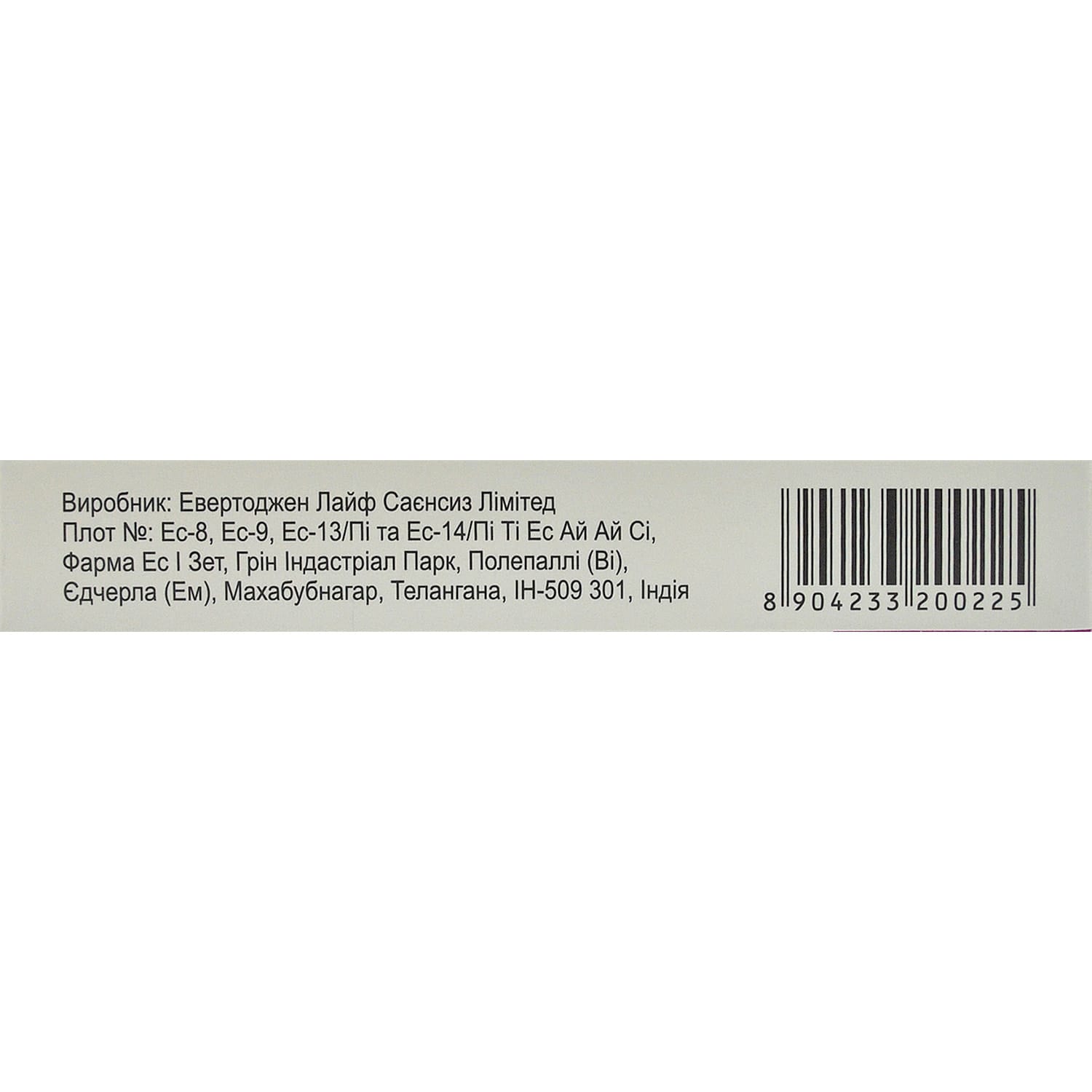
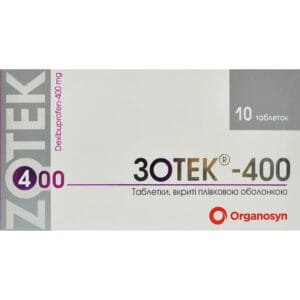
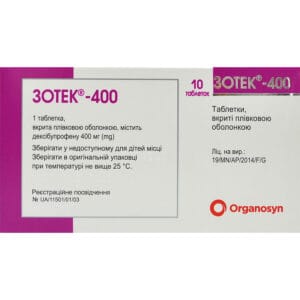

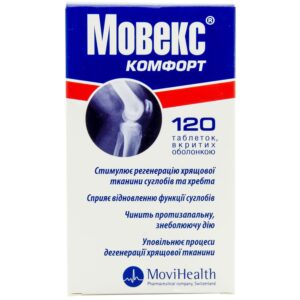
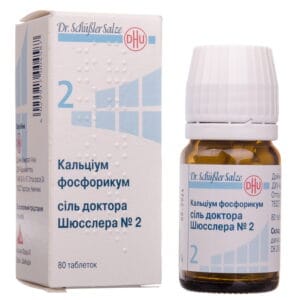
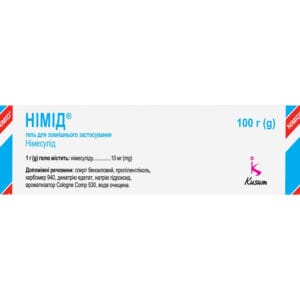
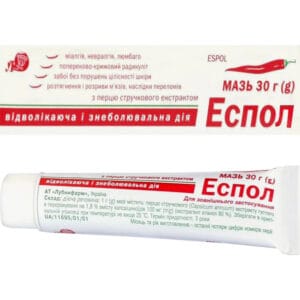
Reviews
There are no reviews yet.